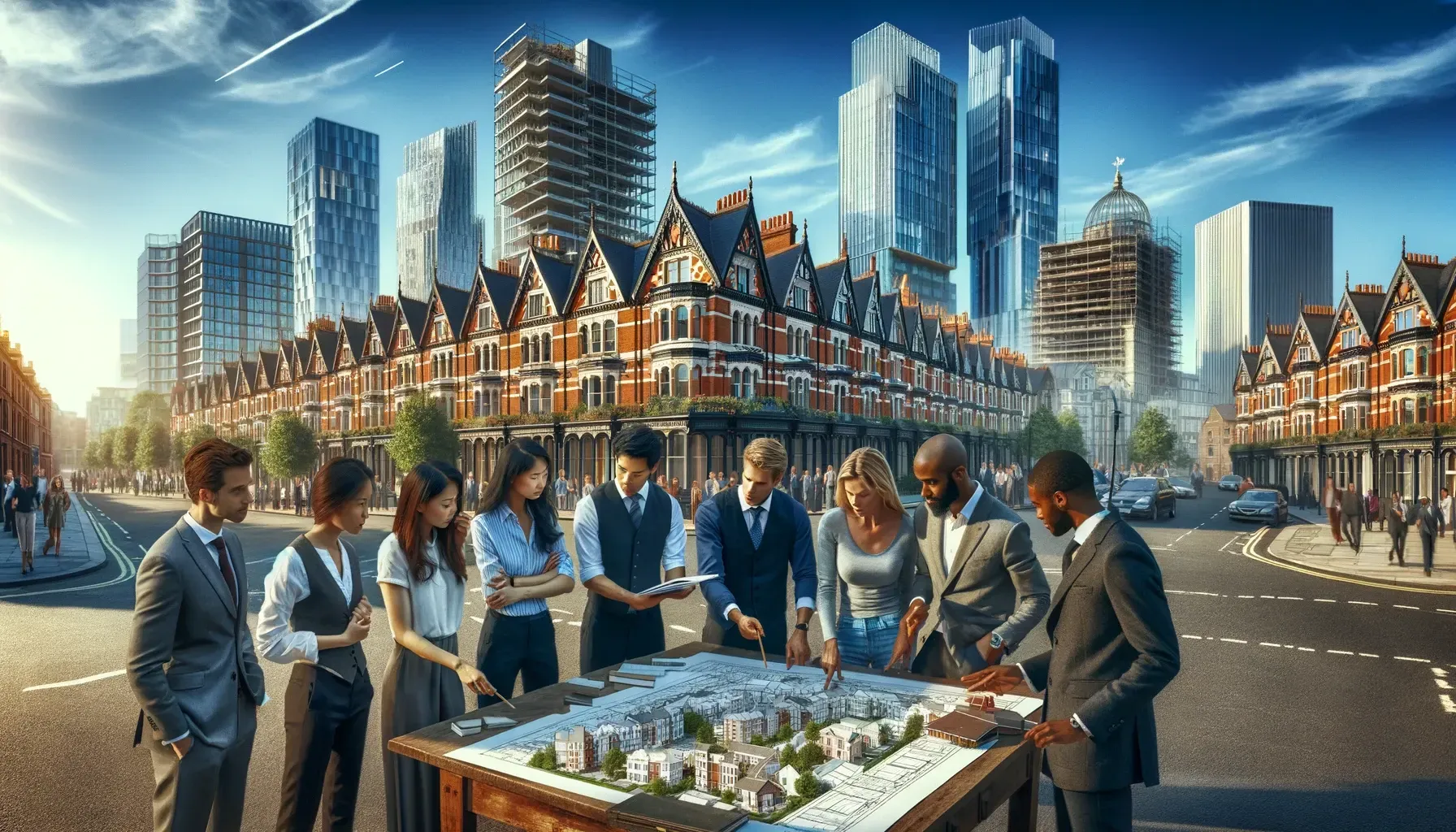By Steve Potter
•
April 21, 2024
Introduction If you're like me, you know that staying on top of the latest trends in the residential property market is key to making smart investment decisions. And let's face it, in today's fast-paced world, things can change in the blink of an eye. So, let's dive in and explore the latest trends that are shaping the residential property market. The Current State of the Residential Property Market Now, let's take a look at some of the emerging trends in the residential property market: Remote Work: The increasing prevalence of remote work has caused a change in the housing preferences of many individuals, with a growing number choosing to buy larger homes in suburban or rural areas. This shift is largely driven by the need for dedicated spaces to accommodate home offices and remote learning environments. Homebuyers now prioritize properties that offer room for these essential work and study areas, reflecting the new reality of flexible and remote working arrangements. Sustainable Living: Sustainable features, such as energy-efficient appliances, solar panels, and green building materials, are becoming more important to homebuyers. Homes with these features tend to have higher resale value and appeal to environmentally conscious buyers. Smart Homes: In today's world, the integration of technology into our homes has become more common and desirable. Many homeowners are now looking for features like smart thermostats, security systems, and lighting controls to enhance their living spaces. One of the main benefits of having a smart home is the added convenience it provides. With a smart thermostat, for example, homeowners can easily control the temperature of their home from anywhere using a mobile app. This allows for greater energy efficiency and can help save money on heating and cooling costs. Additionally, smart security systems offer peace of mind by allowing homeowners to watch their property remotely and receive alerts about any suspicious activity. With features like video surveillance and motion sensors, homeowners can feel more secure knowing their home is being protected. Smart lighting controls also offer convenience and energy savings. Homeowners can schedule lights to turn on and off at specific times or control them remotely, making it easy to create the perfect ambiance in any room. Overall, the integration of technology into homes offers a wide range of benefits including convenience, security, and energy efficiency. As technology continues to advance, we can expect to see even more smart features being introduced to make our homes more comfortable and connected than ever before. Outdoor Spaces: Some buyers are specifically looking for homes with features such as fire pits, outdoor kitchens, and landscaped gardens. Having an outdoor living space allows for safe socializing and enjoying nature without having to leave the comfort of home. As a result, homes with well-designed outdoor areas may command higher prices and attract more interest from potential buyers. Additionally, having a private outdoor space can provide a sense of tranquillity and escape from the stresses of daily life, making it a desirable feature for homebuyers. Multigenerational Living: This trend towards multigenerational living has been fuelled by numerous factors such as rising housing costs, childcare needs, cultural preferences, and the desire to care for aging parents. Families are opting for this living arrangement to foster closer relationships, share expenses, and provide support for each other. Properties that offer separate living spaces or accessory dwelling units have become highly sought after, as they provide the privacy and independence that each generation values while still allowing for communal living. These types of living arrangements can also help to alleviate the challenges and stresses that come with caring for children or elderly family members. Overall, multigenerational living has become a popular and practical solution for families looking to navigate the complexities of modern life. As the trend continues to gain momentum, it is expected to have a lasting impact on the housing market and the way families choose to live together. Overall, the residential property market continues to evolve in response to changing demographic trends and lifestyle preferences. Keeping an eye on these emerging trends can help buyers and sellers navigate the market successfully. Key Residential Property Market Trends Sustainable and eco-friendly homes: As the world shifts its focus towards sustainability and reducing our carbon footprint, investors are now seeking out eco-friendly properties that prioritize energy efficiency. These properties often come equipped with features such as solar panels, green roofs, and the use of recycled materials in construction. By investing in these environmentally conscious properties, investors are not only contributing to a more sustainable future, but also standing to benefit financially overall as the demand for green buildings continues to rise. Smart homes technology: Smart home technology is increasingly being integrated into homes, as investors and homebuyers are seeking modern conveniences and connectivity. This includes IoT devices, smart thermostats, and automated lighting systems. These technologies allow homeowners to control and watch their homes remotely, enhancing security and energy efficiency. The trend towards smart homes is expected to continue as technology advances and becomes more affordable. Co-living spaces: These co-living spaces typically offer fully furnished rooms or apartments, along with shared kitchens, living areas, and sometimes even coworking spaces or fitness facilities. This model allows individuals to live affordably in desirable urban areas, while also fostering a sense of community and social connections. Investors see the potential for high returns on investment in these properties, as they can command competitive rental rates while minimizing vacancies due to the demand for this type of housing. Additionally, co-living spaces often appeal to a younger demographic who value experiences and social interactions over traditional ownership or privacy. As the trend towards urbanization and a more mobile workforce continues, co-living spaces are likely to remain popular among young professionals and millennials. Investors who understand and adapt to this shift in housing preferences stand to benefit from the opportunities presented by the growing demand for communal living arrangements. Mixed-use developments: Mixed-use developments are seeing increased interest from investors as they offer a variety of benefits, including higher occupancy rates and increased opportunities for revenue generation. These developments often feature residential units such as apartments, alongside commercial spaces like retail stores, restaurants, and offices. Additionally, they may include recreational amenities like parks, gyms, or community spaces, creating a more dynamic and attractive environment for residents and visitors. The appeal of mixed-use developments lies in their convenience and efficiency. Residents can live, work, and play all within the same area, reducing the need for long commutes and providing easy access to essential services and amenities. For investors, these projects can offer a more diversified revenue stream and increased stability, as different sectors can support each other in times of economic fluctuation. Furthermore, mixed-use developments can have a positive impact on the surrounding community by revitalizing underutilized areas, fostering a sense of community, and promoting sustainability through efficient land use. As urban populations continue to grow and demand for integrated living and working spaces increases, mixed-use developments are likely to remain a popular choice for investors looking to capitalize on these trends. Remote work-friendly properties: As the COVID-19 pandemic continues to affect the way we work; many employees have transitioned to remote work arrangements. This shift has not only changed where we work, but also what we look for in a home. Properties with dedicated home office spaces have become more desirable as individuals look for a quiet and productive environment to work in. High-speed internet connectivity has also become a crucial factor, as reliable internet is essential for video conferencing and other online tasks. In addition, flexible living arrangements are in high demand as remote workers look for properties that can accommodate their changing needs. This includes properties with space for a home gym, outdoor space for breaks, and proximity to amenities such as grocery stores and parks. Investors are taking notice of this trend and are providing properties that cater to the needs of remote workers. Whether it's renovating existing properties to include home office spaces or developing new properties with remote work in mind, investors are capitalizing on the growing demand for remote work-friendly homes. Overall, the rise of remote work has reshaped the real estate market, with properties that cater to the needs of remote workers becoming increasingly popular. As the trend towards remote work continues, we can expect to see more properties designed with remote work in mind. Urban revitalization projects: This shift towards urban revitalization is driven by a desire to combat urban decay, revitalize neighbourhoods, and create sustainable communities that provide a high quality of life for residents. By investing in these projects, investors can not only help to improve the physical environment of urban areas but also stimulate economic growth, attract new businesses, and increase property values. Furthermore, urban revitalization projects have the potential to address social issues such as affordable housing, gentrification, and inequality by incorporating a mix of housing options that cater to individuals of different income levels. This can help to promote diversity and inclusivity within urban communities and create a fairer and more liveable urban environment for all residents. Overall, urban revitalization projects present a unique opportunity for investors to make a positive impact on the communities in which they run, while also generating financial returns and achieving long-term sustainability goals. By investing in these projects, investors can contribute to the transformation of neglected urban areas into vibrant and desirable neighbourhoods that help both current and future residents. Shift Towards Suburban Living Additionally, the pandemic has made people realise the importance of having outdoor space and access to nature, which is often more readily available in suburban areas. The desire for a slower pace of life and a stronger sense of community is also driving this migration to the suburbs. Moreover, with advances in technology allowing for easier and more efficient remote working, more people are finding that they no longer need to be in a proximity to an office in the city. This flexibility is giving people the freedom to choose where they want to live, leading to a surge in suburban real estate sales. Overall, the shift towards suburban living is likely to continue in the coming years as more people prioritize space, nature, and community over the hustle and bustle of city life. It will be interesting to see how this trend shapes our communities and lifestyles in the future. Rise of Smart and Green Homes Buyers are increasingly looking for homes that not only save them money on energy bills but also offer convenience and sustainability. Smart thermostats, lighting systems, and security features are all becoming standard in new construction and sought after in existing homes. The trend towards green homes goes hand in hand with the desire for environmentally friendly living. Features like energy-efficient appliances, recycled materials, and water-saving fixtures are not only good for the planet, but they also appeal to eco-conscious buyers. In fact, studies have shown that homes with green features can sell for more and faster than those without. As the demand for smart and green homes continues to grow, it's clear that these features are no longer just nice-to-haves but essential elements of a modern home. Investing in these technologies can not only make your property more appealing to buyers but also increase its value overall. In a competitive real estate market, staying ahead of the curve with smart and green features can give you the edge you need to sell your home quickly and for top returns.











